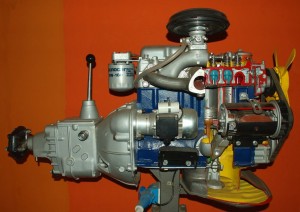WASHINGTON — The word “diesel” conjures up images of soot-covered semis and rattling school buses belching down the road, but while these vehicles are still the main consumers of diesel, they do not present the modern picture of this fuel in regard to passenger cars.

Diesel engines use high internal levels of compression to combust diesel fuel and transform it into energy. (Luc Viatour)
Nearly 50 percent of new cars registered in Western Europe since 2004 run on diesel, according to the European Automobile Manufacturers’ Association. In the U.S., consumption of diesel, the most used alternative to gasoline, is on the rise in passenger vehicles. J.D. Power and Associates estimates the current 3.1 percent diesel market share of U.S. cars rising to 7.4 percent in 2017.
Diesel use in U.S. passenger cars lags behind European use for a number of reasons:
- Emissions: The U.S. Environmental Protection Agency requires fewer emissions compared with European limits. The U.S. requires that vehicles emit no more than .07 grams of nitrogen oxides per mile, compared with .29 grams per mile allowed in Western Europe. While diesel engines previously emitted high levels, recent advances in catalytic converters, filters and after-treatments put the engines on par with gas engines. “Diesel can be as clean as gasoline vehicles in terms of soot and smog,” said Dan Becker, director of Safe Climate Campaign.
- Attention: Consumers have to be willing to put the correct kind of fuel in their vehicle and fill up additional fluids, such as a urea solution that removes nitrogen oxides.
- Cost: Reducing diesel emissions can increase a car’s cost by several thousand dollars. “It’s cheaper to deal with emissions out of a gas engine,” said Mike Millikin, who runs Green Car Congress. In addition, diesel fuel prices have also remained close to gas prices since 2004, removing one incentive for consumers to use the alternate fuel. The EIA said the cost of diesel is higher because of increased demandthat has placed pressure on refining capacity and an additional 6 cent per gallon federal tax that gasoline does not have. “The real driver for diesel cars is if gas gets expensive again,” said Robert McCormick, an engineer at the National Renewable Energy Laboratory.
- Preconceptions: Diesel also lags behind gas because of a bad image. Many people still perceive the fuel as dirty and noisy, said Millikin, despite improvements that can make a diesel-powered Mercedes as silent as any gas-powered one.
However, using diesel engines has certain advantages.
- Energy efficiency: “Diesel has the most efficient internal combustion” of any engine, according to Allen Schaeffer, executive director of the Diesel Technology Forum. Diesel engines allow cars to travel long distances on a single tank of gas and provide torque and power. “For the current type of driving we do in America, diesel makes a lot of sense,” Millikin said. “Diesel engines are 20 to 30 percent more efficient than a gas engine of the same size,” he added. “You get more bang for your buck.”
- Miles per gallon: Because of their energy efficiency, diesel vehicles currently available in the U.S. can achieve approximately 30 mpg city and 42 mpg highway.
- Environmental impact: Because of greater fuel efficiency from higher combustion temperatures and more thorough combustion, cars running on diesel get more miles per gallon of gas and thus emit less carbon dioxide to the atmosphere. “Burning less [fuel] is critical, and that’s the diesel advantage,” Becker said. “The biggest single step that we can take to stop global warming is to get a vehicle to go further on a gallon of fuel.”
Diesel-powered cars in the U.S. will soon have to improve even more to meet President Barack Obama’s recently announced 54.5 mpg rule slated for 2025 and the California Low Emission Vehicle (LEV) III standards.
“That’s going to be a huge bar for diesel folks to meet,” said Millikin. “They’ll meet it.”
Volkswagen’s Stuart Johnson was similarly confident. “We think we can compete,” he said.
While diesel passenger cars do emit less carbon dioxide than gasoline-powered vehicles, they were still responsible for 404.7 million metric tons of carbon dioxide in 2009 alone, according to the U.S. Energy Information Administration.
Diesel fuel can be considered a stepping stone on the path to more environmentally friendly cars, said Jesse Prentice-Dunn, a policy analyst for the Sierra Club. However, the problems associated with petroleum products – including the refining process, transport, carbon dioxide emissions and pollutants – are still associated with diesel fuel.
“In the short term it [diesel] provides for a more efficient car, but in the long-term it’s not a solution,” he said.
